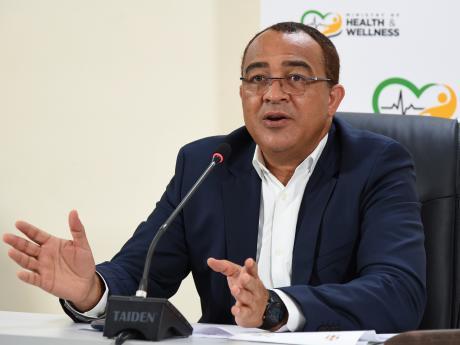Jamaica on high alert for Mpox
The Ministry of Health and Wellness says it has heightened its surveillance to detect any suspected cases of Mpox.
This move follows a recent declaration by the World Health Organization that Mpox is a Public Health Emergency of International Concern.
Minister of Health and Wellness, Dr Christopher Tufton, at a press conference on Thursday, stated that no cases of the disease have been recorded in Jamaica since March 2023, and that the Ministry is fortifying the country's defences against the potential reentry of this health threat.
“We do expect the risks because of the openness of our borders, the normalness of travel and international travel and of course the interaction with persons from far and wide,” he said.
He announced that the government has increased vigilance at the country's ports of entry, and that people visiting the island from countries where Mpox is present may be subjected to a higher level of surveillance by health teams.
“This means that we will increase messaging at our ports and we will interview travellers who have visited countries of interest in the last six months. Anyone with symptoms will be treated according to our protocols, persons without symptoms will be issued health alert cards and told to contact the health department if they develop symptoms,” he said.
The Democratic Republic of Congo is the epicentre of Mpox outbreak, with other African countries reporting cases.
Currently, Sweden, Thailand, Philippines and Pakistan have reported cases outside of Africa.
Mpox belongs to the same family of viruses as smallpox, and can be transmitted by contact and droplet exposure.
It causes symptoms like fever, chills and body aches.
People with more serious cases can develop lesions on the face, hands, chest and genitals.
Jamaica recorded its first case of Mpox in July 2022, between then and March 2023, the country had recorded a total of 21 cases.
No case has so far been recorded this year.
The health minister explained that in non-endemic countries like Jamaica, one case is considered an outbreak.
He said the virus is a class one notifiable disease, which means that clinicians should report suspected cases immediately to the parish health department and the Ministry's national surveillance unit regardless of whether they are exploring other potential diagnoses.
“The overall goal of surveillance, case investigation and contact tracing in this context is to break chains of human to human transmission, and to stop the outbreak, surveillance is critical therefore at this time to rapidly identify cases, and by extension with each case, the clusters in order to provide optimal clinical care, isolate cases to prevent further transmission, identify manage and follow up contacts to recognise early signs of infection to protect frontline health workers and identify risk groups and tailor effective control and prevention measures,” he added.
Tufton shared that the health ministry has been meeting with the four regional health to form a response plan, and that it has also begun its public education and community engagement programme.
Members of the public are also urged to advise the health department if they develop signs and symptoms.
“This is not an attempt at creating any panic or undue alarm, its however an important notification to the public that this is a going concern and we must prepare ourselves and protect ourselves to avoid infection whether from one person, or for a community, this is in the interest of our country and this is how we have to treat with these things,” he said.
Chief Medical Officer (CMO) Dr Jacquiline Bisasor-McKenzie noted that the country has capacity to test for virus, and has a limited supply of vaccines.
But, she noted that mass vaccination and vaccination for travel is not recommended.
“The vaccine is recommended for persons who are close contacts for persons who have been confirmed to have Mpox. It is not given to everyone especially now when the vaccine is in short supply, and countries are being asked - that have stocks of vaccines - to deploy those vaccines to the areas where there is most need and that's on the African continent,” she said.
- Sashana Small
Follow The Gleaner on X, formerly Twitter, and Instagram @JamaicaGleaner and on Facebook @GleanerJamaica. Send us a message on WhatsApp at 1-876-499-0169 or email us at onlinefeedback@gleanerjm.com or editors@gleanerjm.com.

